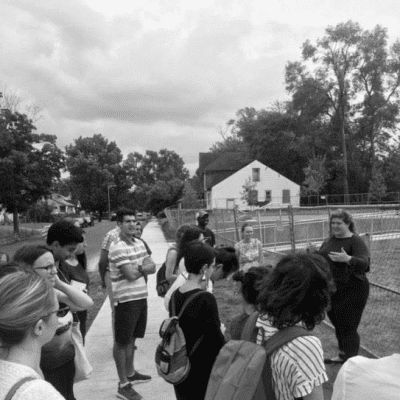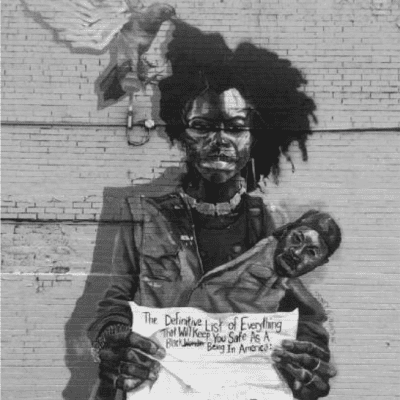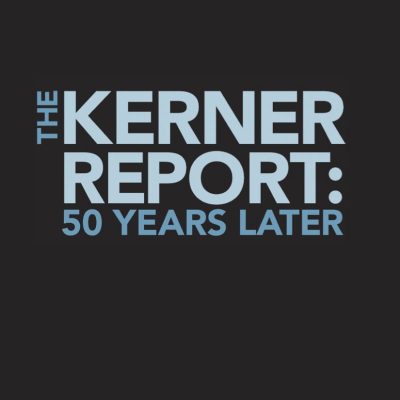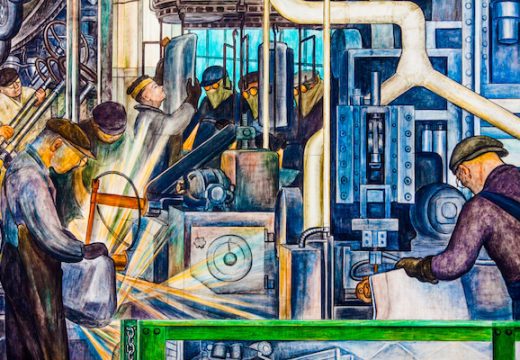Details
Article
The report on “Housing” was produced as a part of the publication: The Kerner Report: 50 Years Later. This publication was released by the 2018 Humanity in Action Detroit Fellowship program.
The population of Detroit, at its peak in the mid-twentieth century, was nearly 2 million. Today, there are roughly 770,000 people, of which over half are renters. (1) Much of this decline in population was aided by racially-motivated federal and state policies that promoted segregation.
Race relations have significantly impacted the current state of housing in the city of Detroit. Once known as the city with the highest number of Black homeowners in the country, (2) Detroit is now a city where homeownership rates for African-Americans are nearly thirty percent lower than their white counterparts. (3)
Extreme disparities in homeownership among black and white Detroiters is a direct result of a longstanding tradition of discriminatory practices. In addressing this housing crisis, public, private, and philanthropic stakeholders throughout the city have engaged in intense debate about how best to respond to housing instability. From this conversation, the debate over rentership versus ownership has become contentious.
This chapter of the report discusses discriminatory policies and practices that force primarily African American residents out of their homes. These policies have been and continue to bar long-time Detroit residents from homeownership. We recognize key actors who are involved in achieving affordable housing in the city, and we offer recommendations that can be considered.
Discriminatory Policies
A number of policies have contributed to the current housing crisis in Detroit. These include but are not limited to: lack of poverty tax exemptions, over assessment of properties, residents not receiving bills, overpriced water utilities, and predatory lending practices. The 2008 financial crisis further exacerbated the state of housing in Detroit.
Once known as the city with the highest number of Black homeowners in the country, Detroit is now a city where homeownership rates for African-Americans are nearly thirty percent lower than their white counterparts.
African-Americans have been systematically excluded from federal programs meant to increase homeownership across the country. Since World War II, the Federal Housing Administration actively enforced neighborhood segregation through racially-restrictive covenants, rezoning, the construction of expressways, redlining, and blockbusting that contributed to white flight. (4) Furthermore, more recent private developments and investments in the downtown and midtown areas have created an increase in property values, which has contributed to the segregation of the city. (5) Residents earning lower wages could not afford their property, concentrating them to specific areas of the city. Data Driven Detroit has published a report illustrating what neighborhoods have are at greatest risk of “neighborhood change” by forecasting changes in property values. (X)
Tax foreclosure is a key housing issue in Detroit and plays a significant role in causing people to leave their homes. Between 2011 and 2015, approximately 100,000 properties have been seized by Wayne County for unpaid taxes. (6) This year alone, 4,800 properties in the city are at risk of being foreclosed. (7) To put this in perspective, about 1 in 4 Detroit properties have been foreclosed from 2011 to 2015.
The Michigan Constitution states that properties cannot be assessed by more than 50 percent of their market value; yet, in Detroit, 55 to 85 percent of residential properties were assessed by more than 50 percent of their market value between 2009 and 2015.
In 2008, market value of properties in Detroit depreciated because of the Great Recession. The Assessment Division of Detroit failed to update property values in the city and assessors did not undertake site visits to properties. Many Detroiters thus paid inflated property tax bills based on overassessed values of their homes. Property taxes are calculated by multiplying the assessed value of a property (minus any exemptions) by the property tax rate. The Michigan Constitution states that properties cannot be assessed by more than 50 percent of their market value; yet, in Detroit, 55 to 85 percent of residential properties were assessed by more than 50 percent of their market value between 2009 and 2015. (8)
Currently when Detroit residents are unable to pay inflated property tax bills, the Wayne County treasurer covers these bills and pays the city. In doing so, the Wayne County treasurer receives the right to foreclose a delinquent property. In the third year of delinquency, after March 31st, Wayne county can begin the foreclosure process on said property. (9)
African-American Detroiters have faced the greatest burden of the tax foreclosure crisis. (10) Certain foreclosures due to unpaid property taxes also should not have occurred because a number of residents should have qualified for the State of Michigan’s poverty tax exemption program. This exemption reduces or removes taxes for lower-income homeowners. Many Detroiters were not notified of this exemption or did not have the resources to apply because of unduly difficult requirements and procedures. (11)
This project is the first of its kind in over 60 years; it is hopefully a first step to providing more accurate residential assessments in the city.
Between 2014 and 2017, the City of Detroit underwent a project to reassess 255,000 residential properties. The results showed assessment reductions of 10% or less for 53% of residential properties and assessment increases of 10% or less for 41% of the properties. In terms of property tax bills, 144,000 properties will pay an average $263 less and the other 112,000 properties will pay an average $80 more. There are other properties in the city that will have even further tax reductions depending on the neighborhood. The reassessment project was conducted using high resolution aerial images, field visits to approximately 11,000 residential properties, and property sales data from October 1, 2014 to September 30, 2016. This project is the first of its kind in over 60 years; it is hopefully a first step to providing more accurate residential assessments in the city. (12)
In 2016, the ACLU of Michigan, along with the United Community Housing Coalition, filed a lawsuit against the city of Detroit for the imposition of unfair property taxes on the poor that led to high rates of foreclosures. At the beginning of July 2018, the ACLU reached a settlement with the city that gives low income homeowners with homes in foreclosure (who likely would have been eligible for poverty tax-exemption) the opportunity to buy back their homes from the county for as low as $1,000. (13) The repurchase is facilitated through a law called the “Right of First Refusal,” whereby the city purchases the homes back from Wayne County in order to re-sell them to foreclosure-threatened residents. To carry this out, the city has entered a cross-sector collaboration with QuickenLoans’ Community Investment Fund and United Community Housing Coalition. Before the city started invoking their Right of First Refusal, residents and organizations such as UCHC’s only option was to bid on the houses in competitive online foreclosure auctions open to the public.
Additionally, the settlement has forced the city to streamline its Homeowners Property Tax Assistance Program in an effort to improve the time consuming and confusing procedures that act as a barrier to low-income residents. (14) Through this remodeled program, the city must inform those who qualify for the poverty tax exemption by mail and allow them the opportunity to apply for the program online. (15)
The city’s reassessment process, improved access to the poverty tax exemption program, and home buy-back programs are a constructive move toward increasing homeownership for long-time Detroit residents, although further efforts are necessary.
Employment Organizations and Initiatives
Last year alone, 249 individuals experienced chronic homelessness as documented in a recent report.
In seeking to understand the complexity of this issue, we have outlined the work of organizations throughout the city into three broad categories. These three categories are rent, homeownership, and a rent-then-own program. They are informed by the priorities of the organizations, the constraints of funding opportunities, and relationships with residents. Each category operates in connection to the public, private, and philanthropic sectors of development in Detroit.
Rent: The City of Detroit Affordable Housing Strategy
Last year alone, 249 individuals experienced chronic homelessness as documented in a recent report. (16) The City of Detroit has established a plan for affordable housing that includes mixed-income developments. The goal is to produce 2,000 affordable housing units by 2023 and preserve the affordability of 10,000 units. (17) The preservation of these properties prevents displacement. The City has traditionally relied upon federal monies from Housing and Urban Development (HUD) to support such projects; however, there is growing interest among the philanthropic and private sector in housing development. (18) Furthermore, the city is making a shift from single-family to multi-family homes; multi-family homes are more amenable for Detroiters who have blended families, live with extended relatives, or live with non-related individuals.
The Detroit Housing Commission has embarked on a Housing Choice Voucher
Homeownership Program to transition renters to owning. To qualify, applicants must meet certain requirements such as having personal savings and gainful employment. (19) While initiatives like this are vital, further efforts need to be taken to help individuals who are not eligible for the program. We recommend broader perspectives on the program, in order to make it accessible for more people.
Homeownership: The United Community Housing Coalition
The United Community Housing Coalition (UCHC) is a grassroots nonprofit organization that works to combat homelessness and increase home ownership in Detroit, especially for individuals whose homes are under threat of foreclosure. Beyond their collaboration with ACLU and the buy-back program, UCHC works with renters and homeowners to negotiate agreements to prevent foreclosure and increase the length of time allotted before displacement. (20)
We cannot overstate the importance of their work in addressing housing inequality in the city of Detroit.
The organization has limited resources, and more houses are being foreclosed upon than they have the power to help owners buy back. Speaking from a limited perspective, we cannot overstate the importance of their work in addressing housing inequality in the city of Detroit. We recommend an expansion of and increased support to programs that focus on increasing home ownership for long-timeresidents.
Rent-then-Own: Cass Community Social Services
The relationship between rentership and home ownership is of considerable importance to the city of Detroit. Just last year in 2017, renters outnumbered homeowners for the first time since 1950. (21) While most efforts have focused on either creating a stronger rental market in the city, or preventing the eviction of homeowners experiencing foreclosure, fewer have made the connection between renting and owning. Cass Community Social Services has been a leader in developing a program which addresses both sets of challenges.
The program has largely depended on private and philanthropic and charitable donations, such as the Ford Motor Company, GM Foundation, and faith-based donations.
Cass Tiny Homes is an initiative which focuses on building scaled- down homes for homeless and lower-income Detroiters. By allowing renters to buy their homes after seven years of renting, the program prioritizes the “rent-then-own” model, while also promoting the building of generational wealth. (22) Additionally, the homes are constructed as green and environmentally responsible.
The initiative seeks to build twenty five Tiny Homes, averaging a cost of around fifty thousand for each home. In considering expanding the program, the topic of funding is a primary concern. The program has largely depended on private and philanthropic and charitable donations, such as the Ford Motor Company, GM Foundation, and faith-based donations.
Technical Housing Solutions
From our conversations within the program, we have identified some measures that may be taken to help address the issue of housing affordability. We have chosen to highlight two measures that are particularly promising.
Environmentally friendly house development
Access to homeownership can also be achieved through developing more sustainable homes. Building and upgrading houses in a way that reduces energy waste not only benefits the environment, but also results in lower utility bills.
Expensive energy bills have played a central role in tax foreclosures in recent years, so reducing these expenses could help reduce new foreclosures. We recommend increasing investment into programs that educate homeowners on how to increase the energy efficiency of their homes, as well as tax credits or subsidies to help address the upfront costs entailed. For any solution, it is crucial that it is rooted in the neighborhoods and the community itself. Homeowner associations, community organizations, and the like would be a natural place to start the work on environmental updates on homes.
Re-thinking the current tax foreclosure system
Given the immensely debilitating effects tax foreclosure can have on a family (e.g.financially, psychologically, emotionally), the use of tax foreclosure should be minimized as much as possible. Matthew Desmond’s book “Evicted”, for example, helps illustrate these adverse effects by showing how housing deplacement can result in a spiral downward into even deeper poverty. (23)
Housing deplacement can result in a spiral downward into even deeper poverty.
We recommend that policymakers consider more constructive alternatives to helping people pay their property taxes as opposed to tax foreclosure. Our service-learning experience with the United Housing Community Coalition showed us that the current system has many spillover costs, such as homeless shelter services, post traumatic stress, mental health services, loss of employment, and an increase in vacant land. In light of this, perhaps the City of Detroit could forgive some unpaid debt, increase the number of years of delinquent taxes before taking action, or look to less punitive actions rather than foreclosure.
Research Note
We recognize that our understanding of this topic has been shaped by the valuable insights of organizations not included in this report but has contributed to our understanding of affordable housing.
United Community Housing Coalition Cass Community Social Services Fitzgerald Project
Fitz Forward
Century Forward
Live6
Mexicantown Community Development Corporation City of Detroit, Housing & Revitalization Department Detroit Future Cities
Richard Rothstein
Elizabeth Rothstein
Eric Dueweke
Adam Hollier
Nathan Bomey
References
- Moskowitz, Peter. “The Two Detroits: A City Both Collapsing and Gentrifying at the Same Time.” The Guardian. February 05, 2015.
- Oosting, Johnathan. New York Times Magazine: Detroit’s black middle class dying with auto industry. Michigan Live. June 26, 2018.
- Joint Center for Housing Studies of Harvard University (Cambridge, Mass.). State of the Nation’s Housing. CJHS, 2017.
- Rothstein, Richard. The color of law: A forgotten history of how our government segregated America. Liveright Publishing, 2017.
- Gallagher, John. “Downtown Detroit sales prices rise to ‘insane’ levels.” Detroit Free Press. April 23, 2018.
X https://datadrivendetroit.org/blog/2018/03/22/turning-the-corner/ - MacDonald, Christine, Nicquel Terry, and Detroit News. “Foreclosures to Be Sold Back
to Owners in ACLU, City Settlement.” Detroit News. July 06, 2018. - MacDonald,C. Wayne County: Detroit Homeowner Drops. The Detroit News.
- Atuahene, Bernadette, and Christopher R. Berry. Taxed Out: Illegal Property Tax Assessments and the Epidemic of Tax Foreclosures in Detroit. (2018).
- Ibid.
- Ibid.
- Oberholtzer, Michele, and Alexa Eisenberg. “Detroit’s Settlement in Tax Foreclosure
Lawsuit Offers Hope, but Fight Continues.” Detroit Metro Times. July 18, 2018. Accessed July 30, 2018. https://www.metrotimes.com/news-hits/archives/ 2018/07/05/visiting-view-detroits-settlement-in-tax-foreclosure-lawsuit-offers-hope- but-fight-continues. - “After Historic Citywide Reappraisal Process, 94% of Detroit Residents to See Less Than 10% Change in 2017 Assessments.” City of Detroit. January 23, 2017. Accessed July 30, 2018. http://www.detroitmi.gov/News/ArticleID/1181/After-Historic-Citywide- Reappraisal-Process-94-of-Detroit-Residents-to-See-Less-Than-10-Change-in-2017- Assessments.
- WJBK. “ACLU Settlement with Detroit Lets Some Residents Keep Houses for $1K.” July 3, 2018
- Runyan, Robin. “Foreclosed Homes to Be Sold Back for $1,000 in ACLU, City Settlement.” Curbed Detroit, July 6, 2018. Accessed July 28, 2018. https:// detroit.curbed.com/2018/7/6/17539942/detroit-sell-back-foreclosed-home-aclu-city- settlement.
- Aaron Mondry. “Detroit’s Foreclosure Crisis: Is the Worst Finally Over?” Model D, June 17, 2018. Accessed July 29, 2018. http://www.modeldmedia.com/inthenews/ foreclosure-crisis-over-071718.aspx.
- Ferretti, Christine. “Annual Detroit Count Shows ‘progress’ on Homelessness.” Detroit News. May 18, 2017.
- City of Detroit. Multifamily Affordable Housing Strategy.
- Ibid.
- Detroit Housing Commission http://www.dhcmi.org/development.aspx
- United Community Housing Coalition. http://www.uchcdetroit.org/services/tax-
foreclosure - US Census, American Community Survey, 2011-2015
- Budds, Diana. “Detroit’s New Starter Home.” Curbed. March 29, 2018.
- Ehrenreich, Barbara. “Matthew Desmond’s ‘Evicted: Poverty and Profit in the American City.’” The New York Times. February 26, 2016.











